【新课标】Unit 4 I used to be afraid of the dark .Section A (4a-4c)课件(共49张PPT)
文档属性
| 名称 | 【新课标】Unit 4 I used to be afraid of the dark .Section A (4a-4c)课件(共49张PPT) | 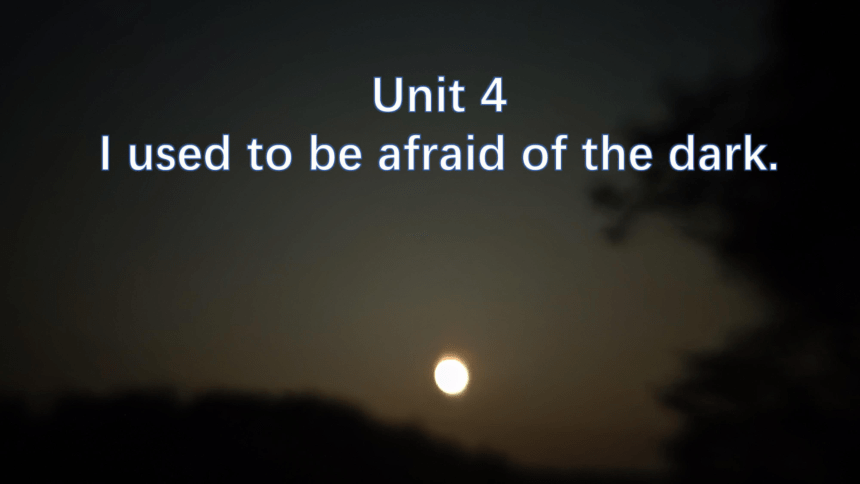 | |
| 格式 | zip | ||
| 文件大小 | 6.1MB | ||
| 资源类型 | 试卷 | ||
| 版本资源 | 人教新目标(Go for it)版 | ||
| 科目 | 英语 | ||
| 更新时间 | 2022-09-12 22:46:06 | ||
图片预览

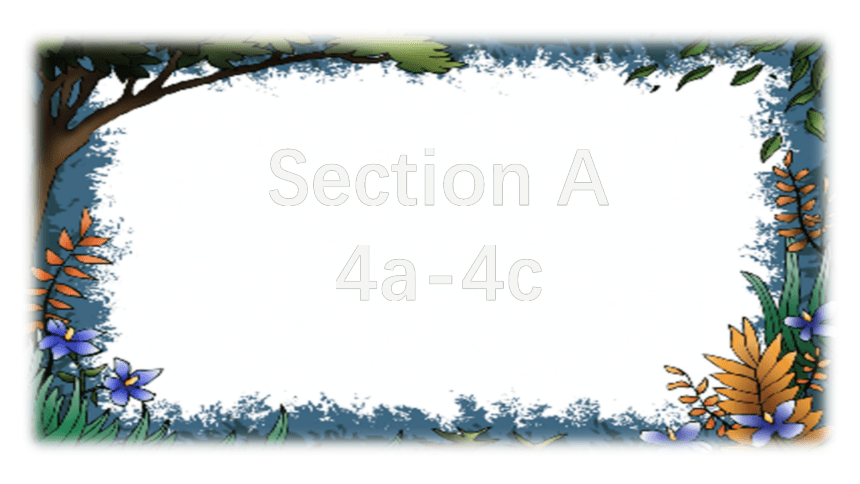
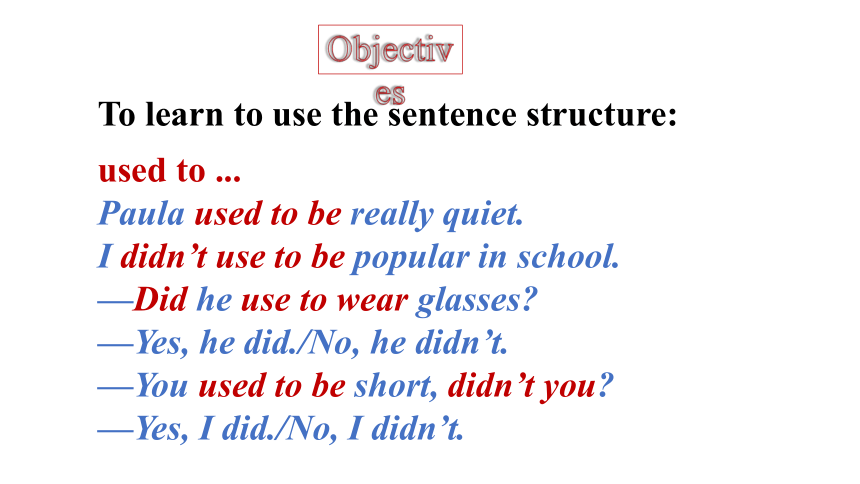
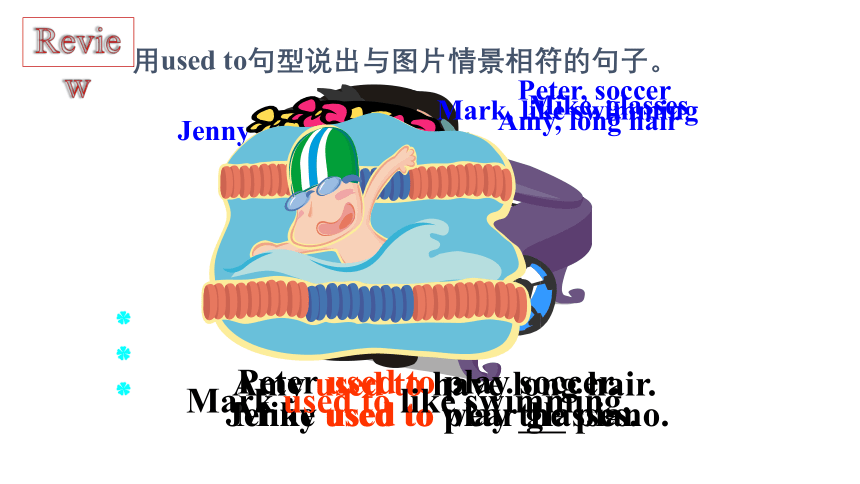
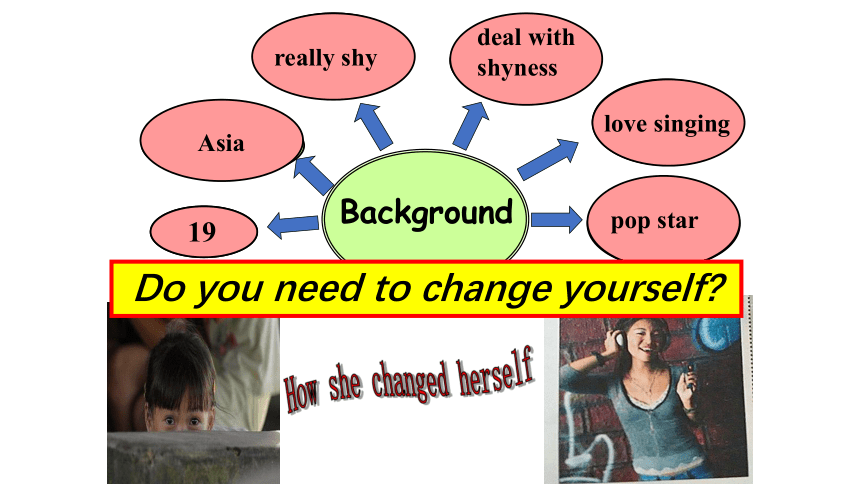

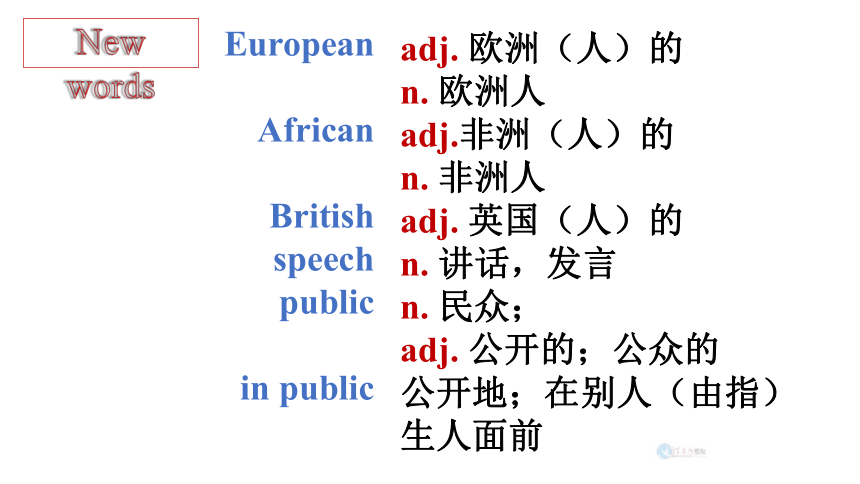
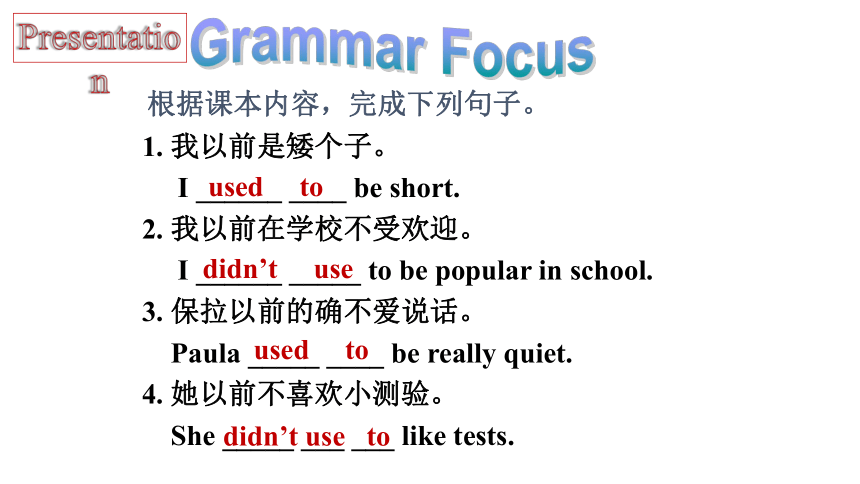



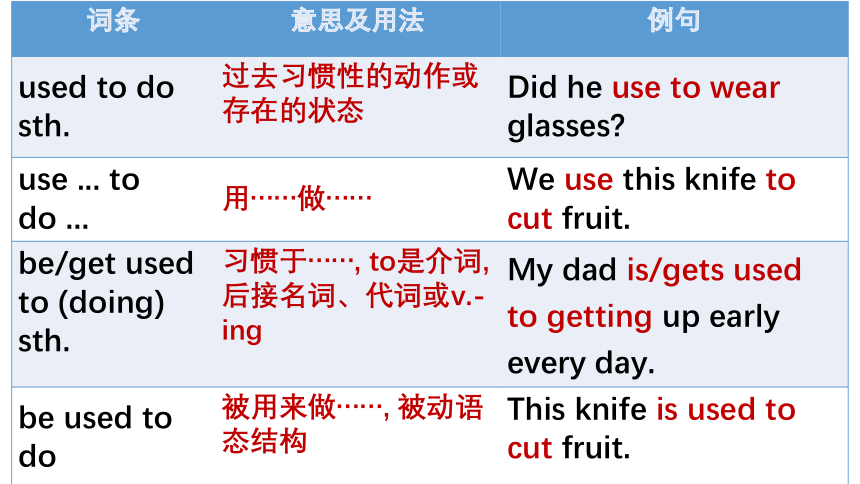
文档简介
(共49张PPT)
Unit 4
I used to be afraid of the dark.
Section A
4a-4c
To learn to use the sentence structure:
used to ...
Paula used to be really quiet.
I didn’t use to be popular in school.
—Did he use to wear glasses
—Yes, he did./No, he didn’t.
—You used to be short, didn’t you
—Yes, I did./No, I didn’t.
Objectives
Jenny used to play the piano.
用used to句型说出与图片情景相符的句子。
Jenny
Mike used to wear glasses.
Mike, glasses
Peter used to play soccer.
Peter, soccer
Amy, long hair
Amy used to have long hair.
Mark used to like swimming.
Mark, like swimming
Review
Background
age
finally become
used to be
hometown
Asia
19
pop star
really shy
hobby
take up singing
deal with shyness
love singing
Do you need to change yourself
How she changed herself
Good things Bad things
1. Being able to travel and meet new people all the time.
2. Get tons of attention everywhere she
goes.
1. Always have to worry about how she appears to others.
2. Have to be careful about what she says or does.
3. Don’t have much private time anymore.
4. There are always guards around her.
About being famous
European
African
British
speech
public
in public
adj. 欧洲(人)的
n. 欧洲人
adj.非洲(人)的
n. 非洲人
adj. 英国(人)的
n. 讲话,发言
n. 民众;
adj. 公开的;公众的
公开地;在别人(由指)生人面前
New words
根据课本内容,完成下列句子。
1. 我以前是矮个子。
I ______ ____ be short.
2. 我以前在学校不受欢迎。
I ______ _____ to be popular in school.
3. 保拉以前的确不爱说话。
Paula _____ ____ be really quiet.
4. 她以前不喜欢小测验。
She _____ ___ ___ like tests.
Grammar Focus
didn’t use
used to
used to
didn’t use to
Presentation
5. 你以前很矮,不是吗?
You used to be short, ______ _____
是的,我是。/ 不,不是。
Yes, I _____. / No, I _______.
6. 他以前戴眼镜吗?
____ he _____ ___ wear glasses
是的,他戴。/ 不,他不戴。
Yes, he _____. / No, he ______.
didn’t you
Did use to
did didn’t
did didn’t
肯定句: 主语+ used to + 动词原形
对比现在和过去: but now …,but not
any more, but not any longer
否定句:
一般疑问句:
Did+主语+use to do sth.
变反意疑问句:
附加疑问部分可用“didn’t +主语”或“did +主语”。
used to 的句型结构
主语 + to do sth.
used not
didn’t use
肯定回答: Yes, 主语+did
否定回答: No, 主语+didn’t。
e.g. Mike used not to study hard.
= Mike didn’t use to study hard.
迈克过去不努力学习。
e.g. —Did you use to go to museums
你以前常去博物馆吗?
—Yes, I did. / No, I didn’t.
是的。/ 不是。
词条 意思及用法 例句
used to do sth. 过去习惯性的动作或存在的状态 Did he use to wear glasses
use ... to do ... 用……做…… We use this knife to cut fruit.
be/get used to (doing) sth. 习惯于……, to是介词, 后接名词、代词或v.-ing My dad is/gets used to getting up early every day.
be used to do 被用来做……, 被动语态结构 This knife is used to cut fruit.
Write sentences about the past using used to.
1. Grace/watch a lot of TV/watch a lot of
movies
___________________________________
___________________________________
点拨:将第一个动作用肯定句来描述过去常进行的活动;将第二个动作用否定句来描述过去不常进行的活动。
Grace used to watch a lot of TV. She didn’t use to watch a lot of movies.
4a
2. my mom/have curly hair/have straight hair
______________________________________
______________________________________
3. Jerry/read books on European history/
read books on African culture
____________________________________
____________________________________
____________________________________
Jerry used to read books on European history. She didn’t use to read books on African culture.
adj. 欧洲 (人)的
n. 欧洲人
adj. 非洲 (人)的
n. 非洲人
My mom used to have curly hair. She didn’t use to have straight hair.
4. Sandy /teach British English / teach
American English
__________________________________
__________________________________
Sandy used to teach British English.
She didn’t use to teach American English.
adj. 英国(人)的
Five years ago Now
didn’t eat a lot of vegetables loves carrots and tomatoes
listened to pop music enjoys country music
watched scary movies hates scary movies
didn’t read a lot of books reads at least six books a year
Look at the information and write sentences about Emily.
4b
e.g. Emily didn’t use to eat a lot of vegetables, but now she loves carrots and tomatoes.
2. Emily used to listen to pop music, but now
she enjoys country music.
3. Emily used to watch scary movies, but now
she hates scary movies.
4. Emily didn’t use to read a lot of books, but now she reads at least six books a year.
Which of these things did you use to be afraid of Which ones are you still afraid of Check the boxes and then ask your partner.
4c
Me I used to be afraid of… I’m still
afraid of…
the dark
being alone
flying
high places
giving a speech in public
Did you use to be afraid of the dark
Yes, I did. And now I’m still afraid of the dark.
Language points
Europe-European America-American
Africa-African Germany-German
Britain-British Italy-Italian
n. adj.
2. in public 公开地;当众
in person 亲身;亲自
in surprise 惊讶地
in fact 其实;事实上
in silence 沉默;无声
in trouble 处于困境中
in danger 处于危险中
“in + n.”短语
e.g. She doesn’t like to be seen in public without her make-up on.
3. a small number of + 可数n.复数
= a few + 可数n.复数
a large number of… = many
a number of… = some
the number of + + 可数n.复数 做主语,谓语动词用第三人称单数。
A number of kids _____ playing by the river. The number of them ____ 9.
are
is
根据汉语提示完成句子,每空一词。
Lucy ___ ______ ___(害怕) the
dark, so she never goes out at night.
2. Did you ___ ___ (过去) play soccer
3. I _______ ____ ___ (过去不常) be popular in school.
4. Paula _____ ___ (过去常常) be really quiet.
is afraid of
use to
didn’t use to
used to
Exercises
完成句子
1. 她过去常常很安静。
She ____ _____ _____ very quiet.
2. 我过去放学后常踢足球。
I _____ _____ _____ soccer after school.
used to be
used to play
句型转换
1. He used to take a walk in the park here. (改为否定句)
He _______ _______ / _______ to take a walk in the park here.
didn’t use
usedn’t
2. She used to hang out with friends on weekends. (改为一般疑问句并作肯定或否定回答)
--- _____ she _____ _____ hang out with friends on weekends
--- Yes,she _______. /
--- No, she _____________.
3. The boy used to chew gum a lot, ______________ he (完成反意疑问句)
Did
use to
did
usedn’t / didn’t
didn’t / usedn’t
He _______ listen to pop music, but now he _______ dancing.
A. is used to; used to
B. use to; is used to
C. used to; is used to
D. used to; used to
【点拨】选C。句意:他过去常听流行音乐,但现在他习惯于跳舞。
He used to _______ in the sun, but now he is used to _______ at night. (2007兰州市)
A. read; read B. reading; read
C. read; reading D. reading; reading
【点拨】 used to do sth. 意为“过去常常做某事”,而be / get used to doing sth.意为“习惯于做某事”。根据本题句意“他过去常常在阳光下看书,但现在习惯在夜晚看书。”可知,正确答案为C。
*used to “过去常常”, 表过去的习惯
*used to + 动词原形
*对比现在和过去: but now …,but not
any more, but not any longer
*否定句:
didn’t use to … /used not to …
*一般疑问句:
Did you use to... /Used you to …
*变反意疑问句,附加疑问部分可用 didn’t /usedn’t 或did / used
used to
Summary
1. Review used to you’ve learned today.
2. Preview the new words and expressions.
3. Preview 1a-2a on page 29-30.
4. Do a survey about what your family members are afraid of. Write a passage about it.
Homework
Goodbye!!
Lily used to have short hair.
①变为一般疑问句:
_____________________________.
_____________________________.
②进行肯定回答:
_____________________________.
③变为否定句:
_____________________________ .
_____________________________.
Did Lily use to have short hair /
Used Lily to have short hair
Yes, she did. / Yes, she used to.
Lily didn’t use to have short hair. /
Lily usedn’t to have short hair.
Watch the pictures about Suining—your hometown. Talk about its changes.
根据下面表中的表述,以 Suining, hometown为题,写一篇短文.
In the past now
Area
buildings
streets
People
Transportation
The environment
used to +V-原形 “过去常常”
be/get used to +名词/代词/V-ing “习惯于做某事或习惯于某事”
be used to do +n. 被用来做某事
He used to get up early. 过去他经常早起。
Now he is used to getting up early. 现在他已经习惯早起了。
(意味着如今他不再早起了)
You’ll soon get/be used to hard work.
你会很快习惯于艰苦的工作的。
The room will be used to be a waiting-room.
这间屋子会被用来做候诊室。
used to & be/get used to doing/ be used to do
介词
Unit 4
I used to be afraid of the dark.
Section A
4a-4c
To learn to use the sentence structure:
used to ...
Paula used to be really quiet.
I didn’t use to be popular in school.
—Did he use to wear glasses
—Yes, he did./No, he didn’t.
—You used to be short, didn’t you
—Yes, I did./No, I didn’t.
Objectives
Jenny used to play the piano.
用used to句型说出与图片情景相符的句子。
Jenny
Mike used to wear glasses.
Mike, glasses
Peter used to play soccer.
Peter, soccer
Amy, long hair
Amy used to have long hair.
Mark used to like swimming.
Mark, like swimming
Review
Background
age
finally become
used to be
hometown
Asia
19
pop star
really shy
hobby
take up singing
deal with shyness
love singing
Do you need to change yourself
How she changed herself
Good things Bad things
1. Being able to travel and meet new people all the time.
2. Get tons of attention everywhere she
goes.
1. Always have to worry about how she appears to others.
2. Have to be careful about what she says or does.
3. Don’t have much private time anymore.
4. There are always guards around her.
About being famous
European
African
British
speech
public
in public
adj. 欧洲(人)的
n. 欧洲人
adj.非洲(人)的
n. 非洲人
adj. 英国(人)的
n. 讲话,发言
n. 民众;
adj. 公开的;公众的
公开地;在别人(由指)生人面前
New words
根据课本内容,完成下列句子。
1. 我以前是矮个子。
I ______ ____ be short.
2. 我以前在学校不受欢迎。
I ______ _____ to be popular in school.
3. 保拉以前的确不爱说话。
Paula _____ ____ be really quiet.
4. 她以前不喜欢小测验。
She _____ ___ ___ like tests.
Grammar Focus
didn’t use
used to
used to
didn’t use to
Presentation
5. 你以前很矮,不是吗?
You used to be short, ______ _____
是的,我是。/ 不,不是。
Yes, I _____. / No, I _______.
6. 他以前戴眼镜吗?
____ he _____ ___ wear glasses
是的,他戴。/ 不,他不戴。
Yes, he _____. / No, he ______.
didn’t you
Did use to
did didn’t
did didn’t
肯定句: 主语+ used to + 动词原形
对比现在和过去: but now …,but not
any more, but not any longer
否定句:
一般疑问句:
Did+主语+use to do sth.
变反意疑问句:
附加疑问部分可用“didn’t +主语”或“did +主语”。
used to 的句型结构
主语 + to do sth.
used not
didn’t use
肯定回答: Yes, 主语+did
否定回答: No, 主语+didn’t。
e.g. Mike used not to study hard.
= Mike didn’t use to study hard.
迈克过去不努力学习。
e.g. —Did you use to go to museums
你以前常去博物馆吗?
—Yes, I did. / No, I didn’t.
是的。/ 不是。
词条 意思及用法 例句
used to do sth. 过去习惯性的动作或存在的状态 Did he use to wear glasses
use ... to do ... 用……做…… We use this knife to cut fruit.
be/get used to (doing) sth. 习惯于……, to是介词, 后接名词、代词或v.-ing My dad is/gets used to getting up early every day.
be used to do 被用来做……, 被动语态结构 This knife is used to cut fruit.
Write sentences about the past using used to.
1. Grace/watch a lot of TV/watch a lot of
movies
___________________________________
___________________________________
点拨:将第一个动作用肯定句来描述过去常进行的活动;将第二个动作用否定句来描述过去不常进行的活动。
Grace used to watch a lot of TV. She didn’t use to watch a lot of movies.
4a
2. my mom/have curly hair/have straight hair
______________________________________
______________________________________
3. Jerry/read books on European history/
read books on African culture
____________________________________
____________________________________
____________________________________
Jerry used to read books on European history. She didn’t use to read books on African culture.
adj. 欧洲 (人)的
n. 欧洲人
adj. 非洲 (人)的
n. 非洲人
My mom used to have curly hair. She didn’t use to have straight hair.
4. Sandy /teach British English / teach
American English
__________________________________
__________________________________
Sandy used to teach British English.
She didn’t use to teach American English.
adj. 英国(人)的
Five years ago Now
didn’t eat a lot of vegetables loves carrots and tomatoes
listened to pop music enjoys country music
watched scary movies hates scary movies
didn’t read a lot of books reads at least six books a year
Look at the information and write sentences about Emily.
4b
e.g. Emily didn’t use to eat a lot of vegetables, but now she loves carrots and tomatoes.
2. Emily used to listen to pop music, but now
she enjoys country music.
3. Emily used to watch scary movies, but now
she hates scary movies.
4. Emily didn’t use to read a lot of books, but now she reads at least six books a year.
Which of these things did you use to be afraid of Which ones are you still afraid of Check the boxes and then ask your partner.
4c
Me I used to be afraid of… I’m still
afraid of…
the dark
being alone
flying
high places
giving a speech in public
Did you use to be afraid of the dark
Yes, I did. And now I’m still afraid of the dark.
Language points
Europe-European America-American
Africa-African Germany-German
Britain-British Italy-Italian
n. adj.
2. in public 公开地;当众
in person 亲身;亲自
in surprise 惊讶地
in fact 其实;事实上
in silence 沉默;无声
in trouble 处于困境中
in danger 处于危险中
“in + n.”短语
e.g. She doesn’t like to be seen in public without her make-up on.
3. a small number of + 可数n.复数
= a few + 可数n.复数
a large number of… = many
a number of… = some
the number of + + 可数n.复数 做主语,谓语动词用第三人称单数。
A number of kids _____ playing by the river. The number of them ____ 9.
are
is
根据汉语提示完成句子,每空一词。
Lucy ___ ______ ___(害怕) the
dark, so she never goes out at night.
2. Did you ___ ___ (过去) play soccer
3. I _______ ____ ___ (过去不常) be popular in school.
4. Paula _____ ___ (过去常常) be really quiet.
is afraid of
use to
didn’t use to
used to
Exercises
完成句子
1. 她过去常常很安静。
She ____ _____ _____ very quiet.
2. 我过去放学后常踢足球。
I _____ _____ _____ soccer after school.
used to be
used to play
句型转换
1. He used to take a walk in the park here. (改为否定句)
He _______ _______ / _______ to take a walk in the park here.
didn’t use
usedn’t
2. She used to hang out with friends on weekends. (改为一般疑问句并作肯定或否定回答)
--- _____ she _____ _____ hang out with friends on weekends
--- Yes,she _______. /
--- No, she _____________.
3. The boy used to chew gum a lot, ______________ he (完成反意疑问句)
Did
use to
did
usedn’t / didn’t
didn’t / usedn’t
He _______ listen to pop music, but now he _______ dancing.
A. is used to; used to
B. use to; is used to
C. used to; is used to
D. used to; used to
【点拨】选C。句意:他过去常听流行音乐,但现在他习惯于跳舞。
He used to _______ in the sun, but now he is used to _______ at night. (2007兰州市)
A. read; read B. reading; read
C. read; reading D. reading; reading
【点拨】 used to do sth. 意为“过去常常做某事”,而be / get used to doing sth.意为“习惯于做某事”。根据本题句意“他过去常常在阳光下看书,但现在习惯在夜晚看书。”可知,正确答案为C。
*used to “过去常常”, 表过去的习惯
*used to + 动词原形
*对比现在和过去: but now …,but not
any more, but not any longer
*否定句:
didn’t use to … /used not to …
*一般疑问句:
Did you use to... /Used you to …
*变反意疑问句,附加疑问部分可用 didn’t /usedn’t 或did / used
used to
Summary
1. Review used to you’ve learned today.
2. Preview the new words and expressions.
3. Preview 1a-2a on page 29-30.
4. Do a survey about what your family members are afraid of. Write a passage about it.
Homework
Goodbye!!
Lily used to have short hair.
①变为一般疑问句:
_____________________________.
_____________________________.
②进行肯定回答:
_____________________________.
③变为否定句:
_____________________________ .
_____________________________.
Did Lily use to have short hair /
Used Lily to have short hair
Yes, she did. / Yes, she used to.
Lily didn’t use to have short hair. /
Lily usedn’t to have short hair.
Watch the pictures about Suining—your hometown. Talk about its changes.
根据下面表中的表述,以 Suining, hometown为题,写一篇短文.
In the past now
Area
buildings
streets
People
Transportation
The environment
used to +V-原形 “过去常常”
be/get used to +名词/代词/V-ing “习惯于做某事或习惯于某事”
be used to do +n. 被用来做某事
He used to get up early. 过去他经常早起。
Now he is used to getting up early. 现在他已经习惯早起了。
(意味着如今他不再早起了)
You’ll soon get/be used to hard work.
你会很快习惯于艰苦的工作的。
The room will be used to be a waiting-room.
这间屋子会被用来做候诊室。
used to & be/get used to doing/ be used to do
介词
同课章节目录
- Unit 1 How can we become good learners.
- Section A
- Section B
- Unit 2 I think that mooncakes are delicious!
- Section A
- Section B
- Unit 3 Could you please tell me where the restroom
- Section A
- Section B
- Unit 4 I used to be afraid of the dark.
- Section A
- Section B
- Unit 5 What are the shirts made of?
- Section A
- Section B
- Review of Units 1-5
- Unit 6 When was it invented?
- Section A
- Section B
- Unit 7 Teenagers should be allowed to choose their
- Section A
- Section B
- Unit 8 It must belong to Carla.
- Section A
- Section B
- Unit 9 I like music that I can dance to.
- Section A
- Section B
- Unit 10 You're supposed to shake hands.
- Section A
- Section B
- Review of Units 6-10
- Unit 11 Sad movies make me cry.
- Section A
- Section B
- Unit 12 Life is full of the unexpected
- Section A
- Section B
- Unit 13 We're trying to save the earth!
- Section A
- Section B
- Unit 14 I remember meeting all of you in Grade 7.
- Section A
- Section B
- Review of Units 11-14
